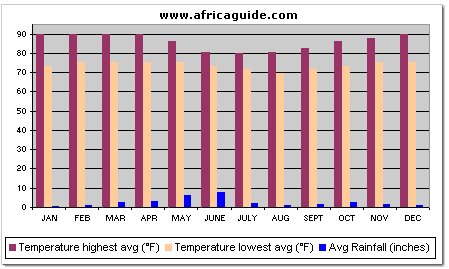Ghana Visitor Information
Parent page
On this page
The climate is tropical but relatively mild for the latitude. Climatic differences between various parts of the country are affected by the sun's journey north or south of the equator and the corresponding position of the intertropical convergence \one, the boundary between the moist southwesterly winds and the dry northeasterly winds. Except in the north, there are two rainy seasons, from April to June and from September to November. In the north squalls occur in March and April, followed by occasional rain until August and September, when the rainfall reaches its peak.
Temperatures range between 21°C and 32°C (70°F - 90°F), relative humidity between 50% and 80%. Rainfall ranges from 30 to 80 inches a year. The harmattan, a dry desert wind, blows from the northeast from December to March lowering the humidity and causing hot day and cool nights in the north. The effect of this wind is felt in the south during January. In most areas, temperatures are highest in March and lowest in August after the rains. Variation between day and night temperatures is relatively small, but greater in the north, especially in January, on account of the harmattan.
To enter Ghana, citizens of all but ECOWAS -member States require visas (at a nominal fee). Visas issued to Egyptian, Kenyan and Zimbabwean nationals are free for the first 30 days, but there is a charge for extended stays. Group visas for tourists may be issued at entry to Ghana if prior arrangements were concluded between the tour operator, the Ghana Tourist Board and the Ghana Immigration Service.
Visa requirements can change at any time - we recommend you contact your local representative to find out the latest requirements
Listing of Ghanian Tourist offices and/or embassies located around the world
Official Currency: 100 pesewas=1 Cedi
Current Exchange Rate: Today's Exchange Rate
The Cedi is far from stable and fluctuates against foreign currencies daily. Bank rates are slightly lower than those obtained from Forex bureaus. Barclays Bank will accept visa and mastercard for cash advances. Unused local currency can be re-exchanged on proof of authorised exchange, and visitors are advised to retain all currency exchange receipts.
ATM machines are available in major towns and cities giving out local currency.
Air
Domestic flights are available on military planes out of Accra airport to Kumasi and Tamale.
Railways / Train Services
A slow but fairly comfortable railway system connects Accra, Kumasi and Takoradi.
Bus
There is a fairly efficient bus services connecting the major cities in Ghana. A minibuses service (called tro-tros) also operates in the country connecting smaller towns and urban areas, these are often overcrowded.
Road
Driving is on the right hand side and an international Permit is recommended. A British licence is acceptable for a period of up to 90 days.
1st January - New Years Day
6th March - Independence Day
1st May - Labour Day
4th June - Revolution Day
1st July - Republic Day
1st December - National Farmers Day
25th December - Christmas Day
26th December - Boxing Day
Moveable holidays: Good Friday and Easter Monday
Electric Power is 220V - 240V running at 50Hz.
The Plug types used in Ghana are: "Type G (British) & D (Indian)"


